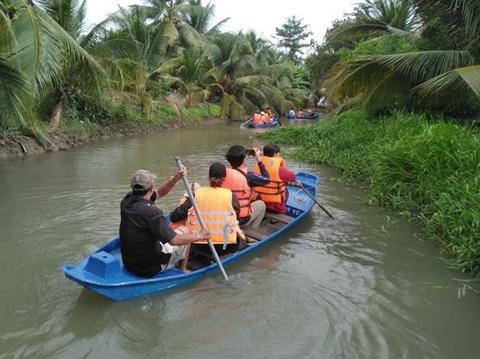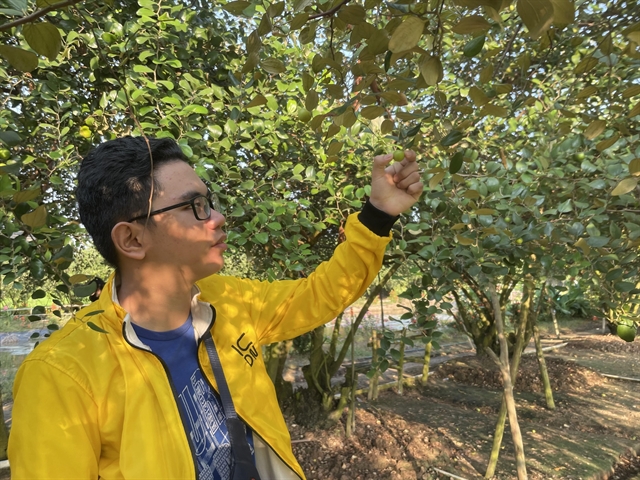
� Photo
Visitors experience canoeing on the river at Đông Nghi Dairy Goat Farm. VNA Photo Minh Hưng
HCM CITY - Leveraging its agricultural characteristics, Tiền Giang province has effectively utilised its advantages to develop agricultural tourism.
This includes activities such as rural sightseeing, homestays, traditional craft villages, and cultural experiences with rural life.
Võ Văn Chiến, deputy director of the provincial Department of Culture, Sports, and Tourism, stated that agricultural tourism in Tiền Giang has yielded practical benefits.
This model not only helps locals protect environmental resources and increase income, but also contributes to preserving and promoting unique local cultures.
Residents have actively participated in tourism development programmes, such as building rural infrastructure that serves both local transportation needs and facilitates tourist visits to fruit orchards, he said.
To effectively exploit the potential of agricultural tourism, the sustainable tourism for poverty reduction programme was implemented in 2005 under the Tiền Giang Mekong Tourism Development Project, funded by the Asian Development Bank (ADB).
The Netherlands Development Organisation, in collaboration with the Department of Trade and Tourism of Tiền Giang province (now the Department of Culture, Sports, and Tourism), facilitated this programme.
It enables farmers to participate in local tourism development, contributing to poverty reduction and cultural preservation, and significantly supports the new rural development programme.
According to the provincial Department of Culture, Sports, and Tourism, there are currently 16 main tourist sites employing thousands of mostly rural workers.
Community-based tourism models in rural Tiền Giang operate effectively, meeting the sightseeing and experiential needs of tourists visiting the province.
From early this year to June 25, the province welcomed 850,000 visitors, a 21.1 per cent increase, achieving 51.5 per cent of the 2024 plan, including 300,000 international tourists, up 60.3 per cent compared to the same period in 2023.
Revenue is estimated at VNĐ600 billion, up 25.3 per cent year-on-year.
A vivid example of effective investment and exploitation of agricultural tourism is the Thới Sơn islet in Thới Hòa hamlet, Thới Sơn commune, Mỹ Tho city, Tiền Giang province.
Previously, residents mainly lived on fishing and aquaculture, along with intercropping fruit trees.
To exploit tourism potential, locals developed beekeeping for honey production and some households started making coconut candy, jams, and handicrafts for tourists.
This type of tourism continues to develop in many areas of Tiền Giang, such as Đông Hòa Hiệp commune in Cái Bè district and Tân Phong islet in Cai Lậy district.
Tourists can stay at local homestays, visit abundant fruit gardens, and participate in rural activities like fishing and honey harvesting.

A resident introduces the beekeeping model at Kỳ Lân Honey Base, Thới Sơn Islet. - VNA Photo
Strategic planning
According to Lê Văn Ý, deputy chairman of Cái Bè district, from early this year to now, local tourist sites attracted around 25,000 visitors, a 20 per cent increase over the same period in 2023.
The collaboration between tour companies and community-based tourism businesses has contributed significantly to local socio-economic development.
Chiến emphasised that for sustainable and effective agricultural tourism development, localities need to plan in potential areas and strengthen management to avoid spontaneous, trend-following activities.

Visitors at Sáu Hồi apple orchard in Kinh Ngang Hamlet, Tân Thành Commune in Tiền Giang. VNA Photo Hồng Nhung
Policies encouraging investment, including capital and tax incentives, are necessary to attract tourism enterprises and farmers to exploit local tourism potential.
Tourism businesses should develop tours to exploit agricultural tourism products, creating environmentally friendly rural tourism products and organising responsible tourism activities.
They should ensure fair economic benefits between enterprises and farmers, he said.
Farmers involved in tourism should upgrade facilities, maintain environmental landscapes, and display friendly and hospitable behavior, respecting and supporting tourists during their visit.
In the early months of this year, the provincial Department of Culture, Sports, and Tourism, in coordination with the Department of Agriculture and Rural Development, organised a training course on community tourism for 30 participants.
The training provided knowledge on rural tourism and community tourism models, aiming to continue effectively exploiting this tourism type in Tiền Giang in the future. - VNS
OVietnam